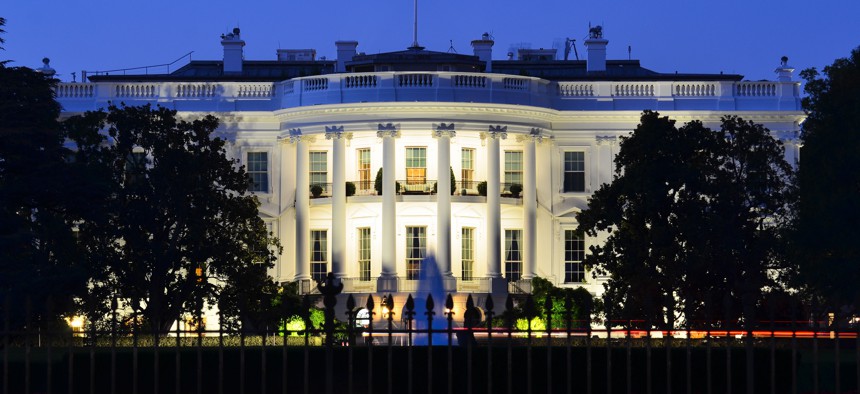Leaders of State and Local Groups Offer Their Thoughts on a ‘Transactional’ White House

The White House. Shutterstock.com / Orhan Cam

Connecting state and local government leaders
The executive directors of the National Governors Association, National League of Cities and National Association of Counties joined Route Fifty on Tuesday for a discussion about intergovernmental affairs.
WASHINGTON — The Trump administration has been actively engaging with state and local governments, but a slew of tough policy issues remain unresolved at the federal level.
Leaders of groups representing governors, counties and cities reflected on this dynamic during a Route Fifty panel discussion here on Tuesday. “This White House has opened its doors to our members," said Matt Chase, executive director of the National Association of Counties.
"Especially on project specific actions,” he added. “It's a very transactional White House.”
Clarence Anthony, executive director of the National League of Cities, echoed that view. “It is transactional,” he said.
NACo had some early wins after Trump took office when it came to scaling back and repealing a “laundry list” of regulations the group opposed, according to Chase. But he said that “now we're getting to the tough stuff with tax reform, health care, infrastructure.”
Referring to the amounts of money that could be affected by federal policy decisions in these areas, Chase added: “We're not talking millions, or even billions, we're talking trillions.”
Scott Pattison, executive director and CEO of the National Governors Association, said the Trump administration and Congress have shown an interest in working with state and local officials.
Still to be seen: “Are we going to truly be listened to? Are the points that we make going to be acted upon and considered as part of legislation and regulatory change?”
The nation’s capital is currently abuzz with talk about several major legislative proposals, in various stages of development, that could have implications for states and localities.
Republicans in the U.S. Senate have revived an effort to scrap significant parts of the Affordable Care Act, the health care law commonly referred to as Obamacare. The latest proposal, like previous legislation, would affect billions of dollars in Medicaid funding that flows to states.
Meanwhile, a White House infrastructure investment plan is slated to be released any day now.
And there’s a GOP-led push in Congress to overhaul the federal tax code. It’s unclear whether this will incorporate plans to roll back either a deduction for state and local taxes, or the exemption for interest earned on municipal bonds.
Anthony, Chase and Pattison indicated their groups are eager to work with the administration and Congress on an infrastructure package, and they voiced support for preserving both the state and local tax deduction and the “muni” bond tax exemption.
Their positions on the latest health care proposal, which Republican Sens. Lindsey Graham of South Carolina and Bill Cassidy of Louisiana have spearheaded, are less firmly established.
"We're skeptical,” Chase said. But he added that NACo was withholding judgement on the legislation until they could review it further.
Anthony said he felt there was “last-ditch sense of urgency” surrounding the health care effort.
“What we are seeing through the summary is that there will still be at least 15 million Americans still uncovered and that’s not our goal in cities,” he said. “Let’s take our time.”
Pattison said some governors have been intrigued with the Graham-Cassidy legislation because they feel it would give their states greater flexibility and because it would provide states with block grants. But others have concerns about the proposal or are opposed to it entirely.
“Generally,” Pattison added, “the governors do feel that when you're talking about something as significant as making major changes to the Medicaid and health care system, the more time the better.” Medicaid provides access to health care for low-income Americans.
Chase said that when it comes to the relationship in the U.S. between federal, state and local government: “There will always be tension.”
“It's about who's going to pay and who's got the power,” he added. “So regardless of the administration there's always going to be challenges.”
A video recording of the entire Route Fifty event, which was part of Government Executive’s 2017 Fedstival program can be found here.
Bill Lucia is a Senior Reporter for Government Executive’s Route Fifty and is based in Washington, D.C.

NEXT STORY: Using Data to Reduce Stigma and Discrimination Around Mental Illness





